Sustainability Leaders Encourage Expo Attendees To Start Small, Remain Committed
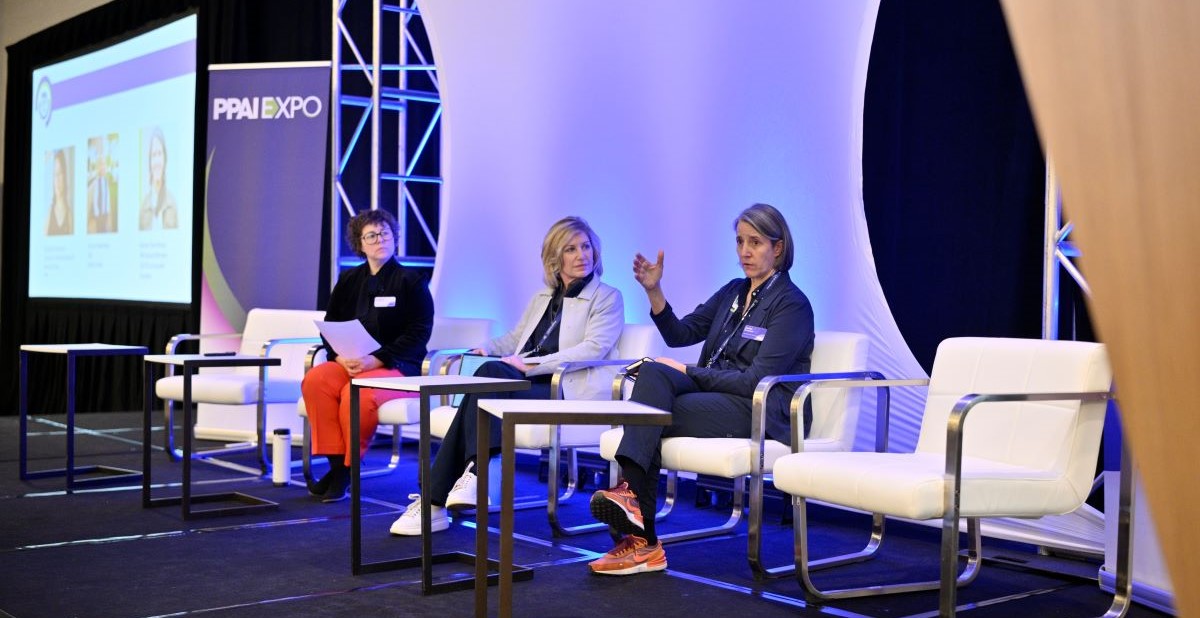
Industry leaders in sustainability and corporate social responsibility (CSR) shared what they’ve learned over the years during several educational sessions at The PPAI Expo Conference on Monday.
Denise Taschereau, CEO and co-founder of Vancouver, British Columbia-based Fairware (PPAI 262992, D7) and incoming PPAI board chair, urged attendees of the “Greenprint For Success: Lessons From Sustainable Corporate Pioneers” session to have confidence and courage when talking clients into purchasing sustainable products.
“There’s always this price sensitivity around sustainable products,” Taschereau says. “If you’re coming from cheap industry basics and moving to organic, you’re going to pay a premium. But it’s not just being organic that’s driving up the cost, it’s the quality, the styling, the color, etc.”
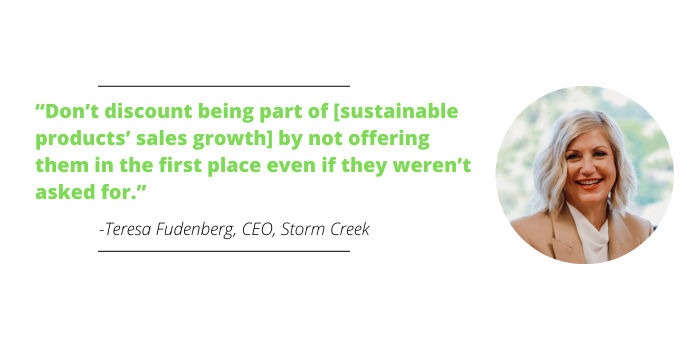
Teresa Fudenberg, CEO of Eagan, Minnesota-based Storm Creek (PPAI 438091, S6), added that sustainable product sales are consistently growing and that it’s a market that distributors should be targeting.
“Don’t discount being part of that by not offering them in the first place even if they weren’t asked for,” Fudenberg says. “Simply offering choices is a sustainable move.”
Getting Started
For companies aiming to plunge into the green wave but unsure how to begin, Reba Joy, director of environmental and social impact at Toronto-based Genumark (PPAI 266066, D11), – ranked the No. 38 distributor in the inaugural PPAI 100 – encouraged attendees of the “Starting Your (Realistic) Sustainability Journey” session to start small and then build.
“It’s about recognizing that we have habits and giving yourself some grace and understanding that they’re tough to break,” Joy says, “while still finding ways to make it easier to break them.”
You also don’t need to go out and hire a dedicated point person to launch (and sustain) your sustainability initiative.
- On average, 68% of distributors and 78% of suppliers say they have an established internal sustainability committee, “green team” or individual head of sustainability, according to the 2023 State of Responsibility.
“Make it a committee if you can,” says Brianna Mazze, vice president of compliance and sustainability at Markham, Ontario-based St Regis Group (PPAI 230188, S6). “If you can’t, do a SWOT (Strengths, Weaknesses, Opportunities, Threats) analysis. If you don’t have any strengths, there’s your opportunity. Take it back to basics and lean on your suppliers because we’re here to help.”
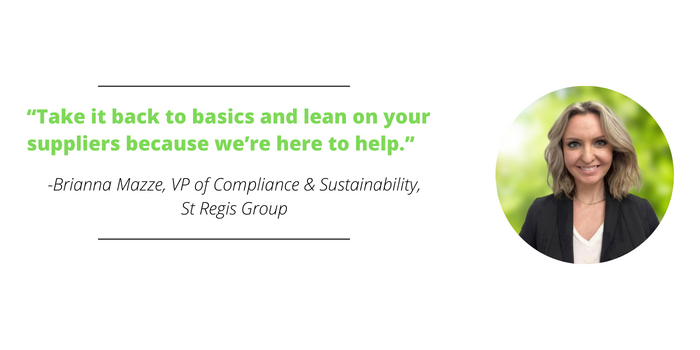
Joy agrees, encouraging distributors and suppliers to have open conversations and share knowledge. Furthermore, she says that any vendor that wants a meeting with Genumark’s clients has to speak to what they’re doing for their environmental and social goals.
“It’s about building that trust,” Joy says. “We can learn from each other. The more we share, the better we’ll both be.”
Be The Change You Want To See
Sustainability-related practices aren’t just product-focused; they also involve internal processes and policies, all of which will affect your bottom line.
“If you’re moving in this direction, start hiring in this direction,” Taschereau says. “Hire based on values.”
However, that doesn’t mean you narrow the talent pool to only those with expertise in green initiatives. Insisting that education is key, Taschereau has her employees subscribe to various environmental newsletters and brings in thought leaders to share their knowledge. She also invites heads of sustainability from suppliers to converse with clients.
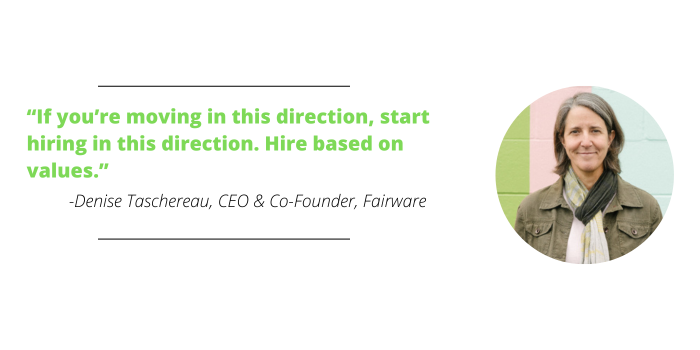
“We’ve also made a list of all the people in the industry that we admire, and I ask employees to follow them to be inspired by them like I am,” Taschereau says.
Education doesn’t stop with your team members – promo firms have a duty to enlighten their customers about the importance of sustainability, too. “We got tired of people saying, ‘Our customers don’t care about that,’ so we launched the Storm Creek Sustainability School,” Fudenberg says.
The program teaches both distributors and end users about the fashion industry’s pollution problem while offering practical steps to embrace eco-friendly practices. Fudenberg’s vision is to reward participants with the latest samples, among other incentives.
PPAI’s Role
All speakers commended the Association for ramping up efforts to promote sustainable practices, including hiring Elizabeth Wimbush as PPAI’s first director of corporate responsibility and sustainability over the summer.
“Elizabeth is putting out content, tools and resources – make sure you read those emails in full,” Joy says. “I’ve learned so much from her over the years. She’s passionate and she’s on your team.”
Meanwhile, Fudenberg recommended that promo pros attend the PPAI Product Responsibility Summit, which features three days of educational sessions on compliance, product safety, supply chain transparency and the latest regulatory changes.
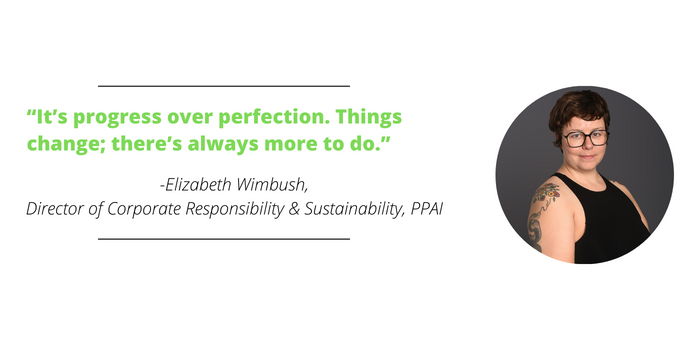
“I’m embarrassed that we didn’t go until last year,” Fudenberg says. “It’s so helpful and shows how we’re all in this together.”
Perhaps the most important lesson of the day: when it comes to sustainability and CSR, there’s no finish line.
“It’s progress over perfection,” Wimbush says. “Things change; there’s always more to do. I’m not an expert, but I want to learn more and share knowledge.”

